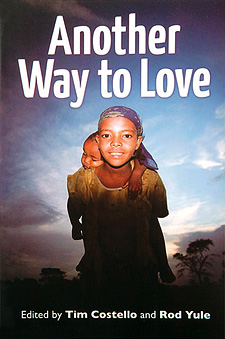Most of the readers of this review will know that our national treasure Tim Costello is the CEO of World Vision Australia. In this book Tim and fellow editor Rod Yule bring together a range of writers (most Australian) addressing issues of poverty, justice and advocacy. Many of them come from the ranks of World Vision and at times you wonder whether you are reading a World Vision newsletter.
The short essays/interviews range from the role of Christians historically in social reform, to the nature of poverty and development, the role of Christians in advocating for the poor, to a theological framework for reform and advocacy, to recent out-workings of these roles with Make Poverty History, The Micah Challenge, fair trade and climate change. Surprisingly there was no particular attention given to issues surrounding our own indigenous population.
 The strength of the book is that for those unfamiliar with Christian social reform it provides a good introduction that will introduce a range of issues which the interested reader can pursue in more detail elsewhere. While there are three questions at the end of each chapter for further reflection, a list of books or articles for further reading would have been a helpful inclusion. Even readers familiar with one or two of the issues will find themselves challenged by issues that they have probably given little attention to.
The strength of the book is that for those unfamiliar with Christian social reform it provides a good introduction that will introduce a range of issues which the interested reader can pursue in more detail elsewhere. While there are three questions at the end of each chapter for further reflection, a list of books or articles for further reading would have been a helpful inclusion. Even readers familiar with one or two of the issues will find themselves challenged by issues that they have probably given little attention to.
The highlight for this reviewer was the interview with Jayakumar Christian, a thirty year veteran of World Vision India. His reflections highlight the relational nature of poverty when he states "The causes of poverty are flawed relationships" and later comments "I believe that the marring of the identity of the poor is a precursor to oppressive relationships" and "I believe that is it only the Christian faith that addresses the issue of identity at a belief level and not simply at an organisational or strategic level".
Andrew Cameron, Moore College lecturer and regular Sydneyanglicans.net / Southern Cross contributor, helpfully deals with some of the practical difficulties that often prevent our engagement with issues of poverty, justice and advocacy such as ‘I do not know enough’ and ‘It's all too big’. He reminds us that just because we cannot do everything does not mean we cannot do anything.
This book attempts to present a balance of theory, theology and experience to give poverty and advocacy a human face. From a human perspective the issues are large and overwhelming. This book helps remind us that we worship a big God who is close to the poor and marginalised and who weeps with them and who calls on each of us to be engaged with them.























